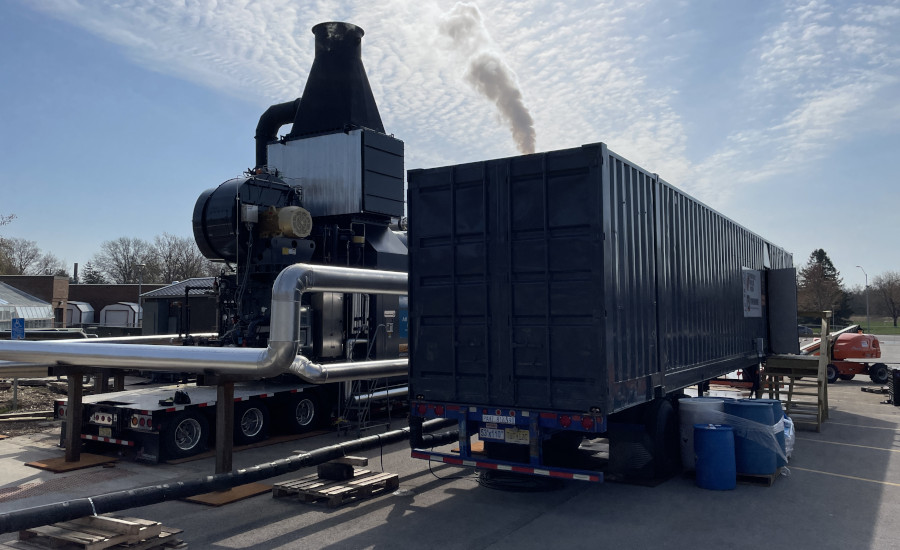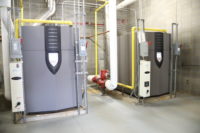The decision to rent or buy a boiler is a critical one for businesses that rely on steam generation for their operations. Rental options offer a range of benefits in terms of modernization, customization, agility, and service costs. Exploring these advantages helps businesses make informed decisions based on location-specific needs and circumstances.
Modernization: Emission reduction and technological upgrades
Renting boilers can be a strategic move for businesses that need to reduce emissions and embrace modern technologies. Older boilers, aged five to 10 years or more, may lack the efficiency and environmental performance of their newer counterparts. Rental boilers offer a cost-effective solution for temporary maintenance shutdowns or capacity-addition requirements, allowing businesses to upgrade without a significant upfront investment.
Modern boiler rentals boast low NOx emissions, with some of Atlas Copco’s units achieving as low as 9 ppm without added emission reduction devices. Selective catalytic reduction (SCR) systems are also available for districts requiring sub-5 ppm NOx levels, such as the South Coast Air Quality Management District (SCAQMD). These boilers also come equipped with remote monitoring and control options, enhancing accessibility and integration with plant management systems.
Moreover, if customers have the necessary electrical infrastructure, choosing fully electric boilers, like Atlas Copco’s RE-50 model, can eliminate their direct (Scope 1) operational emissions from boiler use. Keep in mind that emissions from other sources may still contribute to their overall environmental footprint.
Customizability: Tailored solutions for diverse needs
Fit-for-purpose customization of rental boilers, such as portable boiler rooms, provide businesses with tailored solutions for their steam generation requirements. Portable units range from 50-1,000 horsepower (hp) and supply everything needed for steam production, including feedwater systems, duplex softener systems, and fuel-handling systems for both natural gas and No. 2 oil.
Businesses can opt for containerized boilers if they already have their feedwater systems as part of a larger steam production setup. Trailer-mounted watertube boilers allow for steam requirements higher than 34,500 pounds per hour, the typical max saturated steam output for a 1,0000-hp boiler. Atlas Copco also rents steam accessories, such as standalone feedwater systems and heat exchangers, in addition to portable boilers and watertube boilers.
Another option gaining traction in the rental industry is the rent-to-buy option, wherein customers can rent a boiler and then buy it at the end of the specified rental period. This is a great way to allow for cost-effective access to modern boilers while minimizing downtime associated with lead times on buying new boilers.
Agility: Quick deployment and minimal setup
Agility is one of the primary advantages of renting a boiler for businesses facing sudden spikes in demand or those dealing with emergency situations. Rather than enduring long lead times associated with buying a boiler, renting ensures a quick and efficient solution to keep operations running smoothly. They can be dispatched within a few hours, if available at a nearby location or yard, and are often mounted on highway legal trailers. Containerized solutions, such as Atlas Copco’s RH range (portable boiler rooms), eliminate the need for site setup, offering an almost plug-and-play steam solution. All that is required is level ground to park the trailer and utilities, like water, fuel (natural gas/No. 2 oil), and electricity, to run the boiler controls.
Cost Savings: Mitigating capital expenses and space utilization
Boiler prices and supply chain delays are at an all-time high, and rentals emerge as an attractive option to bridge the gap. Renting a boiler allows businesses to avoid the hefty capital expenses associated with buying a new unit while meeting immediate demands. At a time where steam, much like any other utility, is being looked at as a service and not a commodity, businesses should think of steam as being part of their operational costs rather than a capital expense. Steam-as-a-service gives businesses more control of their usage of steam and the costs associated with it.

Boiler rentals also help businesses conserve the space needed for an on-site purchase. This dual advantage of cost savings and space efficiency makes rental boilers an appealing choice for businesses that need to optimize operational expenses.
Service costs: Performance testing and maintenance
Atlas Copco conducts thorough performance testing before deploying units for rent. This ensures businesses receive a reliable and efficient solution designed to meet their needs. Rental units often undergo a complete cleaning and repainting process, arriving at a job site in near-new condition.
As part of their quality control processes, most companies will test-fire boilers to their full capacity to ensure they will perform precisely as needed. This helps customers avoid unnecessary service costs associated with boiler repairs and breakdowns that may occur due to untested or partially tested equipment.
Conclusion
While buying a boiler is the absolute correct move for a long-term solution, businesses need to start looking at rentals as viable short-term solutions for bridging lead times or temporary downtime. The benefits of modernization, customization, agility, and service costs associated with renting make it an increasingly attractive option for businesses seeking flexibility and efficiency in their steam solutions. By weighing these advantages against specific operational needs, businesses can make informed choices that contribute to both their short-term success and long-term sustainability.



